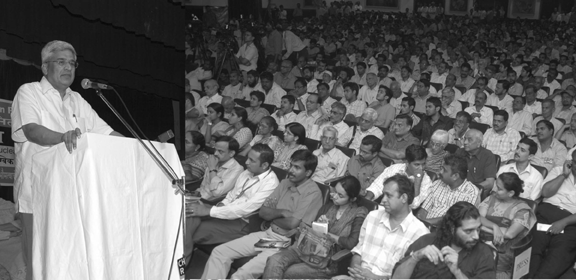 People's Democracy
People's Democracy
(Weekly
Organ of the Communist Party of India (Marxist)
No. 43
October 28, 2007
(Weekly
Organ of the Communist Party of India (Marxist)
|
Vol.
XXXI
No. 43 October 28, 2007 |
MAHARASHTRA
'The Left Parties Shall Not Compromise On National Sovereignty'

Prakash Karat addressing the meeting organised by 'Committee For Independent Foreign Policy' in Mumbai on October 18
P R Krishnan
“Sovereignty oF THE NATION is supreme to us and cannot be allowed to be compromised. The Left parties are opposing Indo-US nuclear deal not because we are against nuclear energy or against the people of America. We are opposing it because the deal endangers our national sovereignty. The 123 agreement read with Hyde Act makes it clear that once the deal is formalised, India cannot have its independent foreign policy. The US will then be free to dictate to us. We don’t want that to happen”, said the CPI(M) general secretary Prakash Karat in Mumbai on October 18.
Prakash Karat was addressing a packed meeting in Patkar Hall near Churchgate in South Mumbai organised under the banner of 'Committee on Independent Foreign Policy'. He and the CPI general secretary A B Bardhan were the main speakers on the occasion. The former prime minister V P Singh and Justice P B Sawant were also scheduled to address the meeting but could not attend as they were not well. Justice Hospet Suresh chaired the meeting while S P Shukla was the other speaker.
Touching upon and explaining the various features of the deal, Karat highlighted the intention of our ruling classes to have a strategic partnership with imperialist America using this nuclear deal. The trap is to make India a junior partner of USA, he said. “After independence, we evolved a national policy of non-alignment and independent foreign policy. We cannot barter away our independence”, he asserted. Karat pointed out that importing costly nuclear reactors as a part of the deal would be burdensome to the people and recalled the experience of Enron project Dabhol in Maharashtra. He also said that once the deal is formalised, the entry of multinational companies like Wal-Mart into retail trade and entry of foreign universities cannot be stopped and this process would spread to other important sectors, including defence establishment.
Citing the recently held joint naval exercises with US in the Bay of Bengal, Karat linked them to the overall strategic alliance being developed. He pointed out that the nuclear deal itself was not a sudden development. It was preceded by several agreements between India and US. The prime minister Manmohan Singh during his visit to US in 2005 signed the Global Partnership for Democracy Agreement with president George Bush. “What democracy the USA practices outside its borders is well known. And for such ‘democratic’ ventures George Bush wants India not only to be a partner but also to act as an executor”, he said. This agreement was then followed by the Strategic Economic Partnership Agreement and thereafter came the Defence Framework Agreement. When the Left sought clarification on nuclear deal in parliament in August 2006, the prime minister gave a categorical assurance that our national interests will be safeguarded. But what followed was just the opposite as the Hyde Act passed by the US in December 2006 severely compromised our national interests. This Act determines what nuclear policy and foreign policy will have to be followed by India, said Karat. He appealed to the UPA government and the Congress party to give more emphasis on implementation of the National Common Minimum Programme which is vital for the economic progress and social well being of the vast majority of the people of the country.
CPI general secretary A B Bardhan in his speech referred to the BJP-led NDA government and recalled how the then prime minister A B Vajpayee began praising America as India’s natural ally. He said that when the people of the country unseated the NDA government and voted to power the Congress-led UPA in the last election they did not want the Manmohan Singh government to follow its predecessor’s policy. He criticised the government for totally disregarding the commitment made in the Common Minimum Programe to maintain independent foreign policy by signing these agreements with US. To please US administration, the Indian government voted against Iran twice in the IAEA. This was in spite of Iran declaring that its nuclear proramme was for peaceful purposes. The Left had strongly objected to this surrender of the UPA government. Bardhan hit out against those who were questioning the patriotism of the Left saying history showed the Left was second to none on this score. He said the Left is worried about our national sovereignty being compromised by this deal. Referring to the need for developing nuclear energy, Bardhan said that we should try to develop indigenous sources of energy which will be beneficial to our economy. He said if the UPA chairperson Sonia Gandhi and prime minister Manmohan Singh are serious that the UPA government is not a one issue government, then they should give up the disastrous course and concentrate on implementation of the Common Minimum Programme.
Professor Ram Sagar Pande of Janwadi Lekhak Manch conducted the proceedings of the meeting. Seated on the dais were Dr Ashok Dhawale, CPI(M) Maharashtra state secretary, Bhalchandra Kango, CPI Maharashtra state secretary, K L Bajaj, Maharashtra state CITU president Mahendra Singh, CPI(M) Mumbai secretary, Prakash Reddy, CPI Mumbai secretary, Sukumar Damle, AITUC general secretary and Firoz Mithiborwala, Datta Ishwalkar, Jatin Desai and Meena Menon, functionaries of the Committee for Independent Foreign Policy.
Earlier in the day Prakash Karat addressed a press conference at the Azad Maidan office of the CPI(M) at Fort Mumbai.